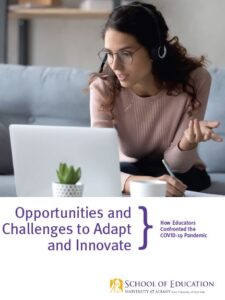NYKids Team Presenting Study Findings at AERA Annual Conference
by Aaron Leo and Kristen C. Wilcox
The NYKids team is getting ready to head to Chicago for the American Educational Research Association’s annual conference. We’re excited to present findings from our latest study exploring the effects of the pandemic on educators throughout New York State.
As we have discussed in previous posts, the study utilized interview and focus group data from 88 educators in 6 schools and focused on five primary lines of inquiry:
- Collaboration
- Leadership
- Academic Learning
- Social-emotional development
- Family and community engagement
At the conference, NYKids team members Aaron Leo and Kristen C. Wilcox will present a paper drawn from the final line of inquiry which focused on family and community engagement. In this blog we recap our findings and discuss their relevance to this year’s theme: “Interrogating Consequential Education Research in Pursuit of Truth.”
Family Engagement in Positive Outlier Schools
 Educators in positive outlier schools described numerous challenges as they sought to engage families during the pandemic.
Educators in positive outlier schools described numerous challenges as they sought to engage families during the pandemic.
- For one, educators often felt disconnected from family members as traditional engagement strategies were not possible due to social distancing mandates.
- In contrast, some families concerned over their children’s schooling frequently contacted educators. While educators utilized various platforms to connect with family members, the constant access provided by online technology made it difficult for educators to maintain personal boundaries.
Participants also noted the inequalities that emerged during the pandemic in regards to family engagement.
- For instance, educators noted that families without reliable internet access or working computers were not able to fully participate in remote schooling or connect with school staff regarding their children’s academics or pandemic-related news.
- Working families also were strained as they were often unavailable to oversee their children’s remote learning.
Despite these challenges, educators described several strategies they found effective to engage families during the pandemic.
- First, educators explained the importance of using a variety of tools to communicate with families including virtual applications, emails, phone calls, as well as home visits to ensure families could engage with school staff in ways that best suited their communication style and work schedule.
- Educators also strove to be accessible to families especially during periods when the schools were shut down. Although setting boundaries became an issue at times, educators felt that their continued presence was crucial in assuaging the concerns of family members.
- Lastly, educators explained the need to go beyond communicating with family members and to address the economic challenges exacerbated by the pandemic by collecting and distributing food, supplies, and other resources to families throughout the pandemic.
Connecting to AERA’s Annual Conference Theme:
This year’s conference theme “Interrogating Consequential Education Research in Pursuit of Truth” raises important questions about the role researchers can play in public discourse.

As AERA President Rich Milner explains, “education research can (and should) be at the center of co-constructing with communities agendas of consequence.” Yet, Milner asserts that the primary goal of research must be to uncover and address social inequities:
However, the recommendations, implications and insights garnered from research must be interrogated in pursuit of truth to avoid and/or disrupt attempts to stifle progress toward justice and equity. Without deep, sustained, and systematic interrogation, we may not advance humanizing, opportunity centered projects of impactful consequence.
These issues are closely related to issues of family engagement especially with regard to the heightened tensions around differing views of what is appropriate content to be taught in public schools.
NYKids research suggests that kids benefit when educators and family members maintain open dialogues and listen empathetically to different views.
Thank you for your interest in NYKids. You may visit our webpage for the latest research and news, and follow us on Twitter, Instagram, or Facebook, for announcements.
